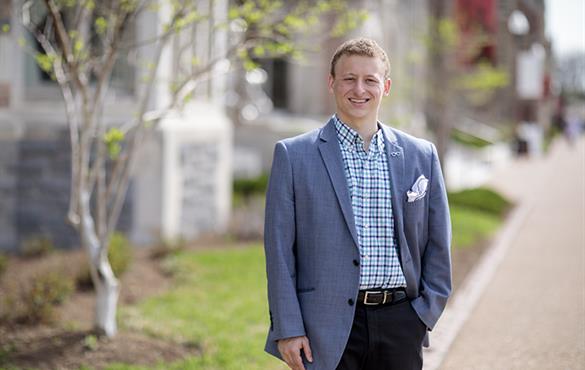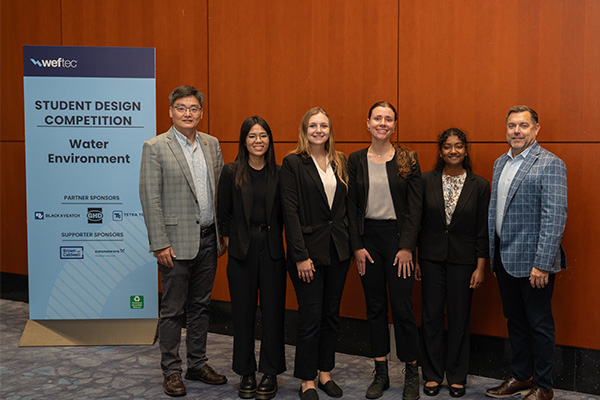A well-rounded entrepreneurial education
Class Acts-Innovation: ‘Business school gave me strategy, engineering gave me tactics’

Michael Kramer has always taken things to the next level.
While most teenagers aren’t averse to doing occasional yard work or dog walking for their neighbors, Kramer turned neighborhood side gigs into a full-fledged business while he was in high school. He matched his peers with neighboring households in need of services, everything from tutoring to shoveling snow.
“Anything that fell in the general, ‘Hey, can I get a neighborhood kid to do this with me?’” he said, “but in a little more structured manner.” As for him? He was part of the team on most jobs and took a cut off the top on the rest.
That work ethic didn’t change when Kramer enrolled in Olin Business School at Washington University in St. Louis as a first-year student in 2014. Instead of simply getting involved in pickup games or intramural sports, he competed on the university’s triathlon team for five years, including as a graduate student at the McKelvey School of Engineering. He also served as team president for four semesters and on its executive board for nine semesters.
He didn’t really hesitate when it came to applying to Washington University; both of his parents are alumni. Even so, the decision to enroll here was very much his own. Kramer joined his parents’ ranks a year ago when he earned a bachelor’s degree from Olin. Currently he is pursuing his master’s degree in data analytics and statistics from McKelvey. With these two degrees, he feels well-positioned for his dream job: entrepreneur and CEO.
He already has had several successes, including the app Regavi, which grew out of a school project in the entrepreneurship capstone course, The Hatchery. Regavi started as a contact management app, a kind of virtual business card exchange, and is evolving toward becoming the most secure means to store and share personal information.
He attributes a substantial amount of the success the company has had thus far to the support he has received from the university’s Skandalaris Center for Interdisciplinary Innovation and Entrepreneurship, which offers The Hatchery course.
The app allows users to create groups, each with access to the information the user chooses. Ultimately, Kramer sees Regavi as becoming a way to securely share not just contact information, but also sensitive information, such as financial information and medical records, with businesses and corporate entities.
But first, how did his interest in entrepreneurship start?
“For the longest time, I thought I’d be a veterinarian, but I realized that I couldn’t handle euthanasia. Still, I saw the impact vets had and thought, ‘What can I do to contribute?’ If I can keep people’s pets happy, I can keep that sense of joy in their life. … It was just this focus on the word ‘impact.’ What can I do to contribute?
“Also, the ability to create something that’s going to impact millions, maybe billions of people, is something that I just find rather tantalizing.”
“Take classes that you think will matter. Don’t be afraid.”
“In the long term, if I don’t end up CEO of my own company, my long-term goal is to be a CPO (chief product officer) or a CIO (chief innovation officer). Those fields come back to the concept of product management. It’s communication between and contribution to both business and tech teams.
“It won’t just be, ‘Do this, though I have no idea how you’re going to do it.’ I’ll have that understanding. Business school gave me strategy, engineering gave me tactics.”
While most teenagers aren’t averse to doing occasional yard work or dog walking for their neighbors, Kramer turned neighborhood side gigs into a full-fledged business while he was in high school. He matched his peers with neighboring households in need of services, everything from tutoring to shoveling snow.
“Anything that fell in the general, ‘Hey, can I get a neighborhood kid to do this with me?’” he said, “but in a little more structured manner.” As for him? He was part of the team on most jobs and took a cut off the top on the rest.
That work ethic didn’t change when Kramer enrolled in Olin Business School at Washington University in St. Louis as a first-year student in 2014. Instead of simply getting involved in pickup games or intramural sports, he competed on the university’s triathlon team for five years, including as a graduate student at the McKelvey School of Engineering. He also served as team president for four semesters and on its executive board for nine semesters.
He didn’t really hesitate when it came to applying to Washington University; both of his parents are alumni. Even so, the decision to enroll here was very much his own. Kramer joined his parents’ ranks a year ago when he earned a bachelor’s degree from Olin. Currently he is pursuing his master’s degree in data analytics and statistics from McKelvey. With these two degrees, he feels well-positioned for his dream job: entrepreneur and CEO.
He already has had several successes, including the app Regavi, which grew out of a school project in the entrepreneurship capstone course, The Hatchery. Regavi started as a contact management app, a kind of virtual business card exchange, and is evolving toward becoming the most secure means to store and share personal information.
He attributes a substantial amount of the success the company has had thus far to the support he has received from the university’s Skandalaris Center for Interdisciplinary Innovation and Entrepreneurship, which offers The Hatchery course.
The app allows users to create groups, each with access to the information the user chooses. Ultimately, Kramer sees Regavi as becoming a way to securely share not just contact information, but also sensitive information, such as financial information and medical records, with businesses and corporate entities.
But first, how did his interest in entrepreneurship start?
What was your first foray into entrepreneurship?
“In the fourth grade, I bought an old spin-art machine, the ones where you throw the dye on the paper. I bought fabric dye rather than traditional spin art dye. I spun it on the paper, took the paper off, plastered it on shirts, and went around my neighborhood selling these spin-art shirts.”
Was it a success?
“We had some sales. I sold out most of my inventory.”
What’s your motivation?
“Before I knew what entrepreneurism was, as a kid it was just, ‘I want money.’ I want to buy the newest toy or video game, or whatever.“For the longest time, I thought I’d be a veterinarian, but I realized that I couldn’t handle euthanasia. Still, I saw the impact vets had and thought, ‘What can I do to contribute?’ If I can keep people’s pets happy, I can keep that sense of joy in their life. … It was just this focus on the word ‘impact.’ What can I do to contribute?
“Also, the ability to create something that’s going to impact millions, maybe billions of people, is something that I just find rather tantalizing.”
What advice do you have to budding entrepreneurs heading to Washington University?
“Get involved. The earlier you can get involved, the more perspective you’ll have when you’re ready to start a venture.“Take classes that you think will matter. Don’t be afraid.”
What’s next?
“I’m starting at Capital One in August, with special permission to continue working on my venture.“In the long term, if I don’t end up CEO of my own company, my long-term goal is to be a CPO (chief product officer) or a CIO (chief innovation officer). Those fields come back to the concept of product management. It’s communication between and contribution to both business and tech teams.
“It won’t just be, ‘Do this, though I have no idea how you’re going to do it.’ I’ll have that understanding. Business school gave me strategy, engineering gave me tactics.”



